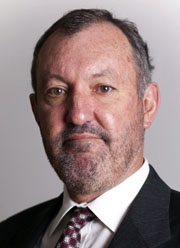 |
Judge Ian van der Merwe
Photo: Rian Horn
29 November 2012 |
The Council of the University of the Free State (UFS) unanimously re-elected Judge Ian van der Merwe as its Chairperson for the next three years at its last meeting for this year on Friday, 16 November 2012.
Judge Van der Merwe is a Judge of the Free State High Court. He is an alumnus of the UFS and has been a member of the Council since 9 March 2007.
In accepting his appointment, Judge Van der Merwe said that he was honoured and humbled to lead a Council of this calibre for a second term. “The Council is setting a good example of what good governance at a higher education institution should look like. Meetings are conducted in good spirit and decisions made in the best interest of the university,” he said.
“Having sat on councils of many universities before, I can say with great surety that, on balance of expertise and backgrounds, the UFS has one of the most effective councils in the country and, to have a Chairperson of Judge Van der Merwe’s stature, is a privilege. His leadership and guidance is greatly appreciated,” said Prof. Jonathan Jansen, Vice-Chancellor and Rector.
Mr Edward Kieswetter, Group CEO and Executive Director of Alexander Forbes and Deputy Chairperson of the UFS Council, and Mr Jonathan Crowther (former editor of Volksblad) have been re-elected for a further term of four years in the category: "Appointed by the Council".
External Council members were given a tour of the Bloemfontein Campus after the meeting, followed by an induction session for new council members.
New Council members who joined this year are:
Derek Foster, in the category appointed by the Council
Ruben Gouws, elected by the non-academic staff
Lorraine Kriek, elected by the Alumni
Themba Mmabi, representative of the Minister of Higher
Education and Training
Sabelo Khumalo, SRC President, Qwaqwa Campus
William Clayton, SRC President, Bloemfontein Campus
Suraya Jawodeen, representative of the Minister of Higher
Education and Training
Mr Dan Mosia, representative of the Minister of Higher Education and Training